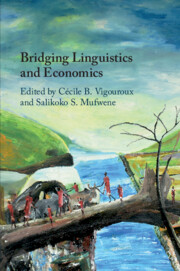Book contents
- Bridging Linguistics and Economics
- Bridging Linguistics and Economics
- Copyright page
- Contents
- Figures
- Tables
- Contributors
- Preface
- 1 Do Linguists Need Economics and Economists Linguistics?
- 2 Economists Do Need Linguists
- 3 The Invisibility of Linguistic Diversity Online
- 4 Evaluating Language Policy and Planning
- 5 The Economics of Language Diversity and Language Resilience in the Balkans
- 6 Determinants of Bilingualism among Children
- 7 Economy and Language in Africa
- 8 The Unequal Exchange of Texts in the World Language System
- 9 Language Economics and Language Rights
- Author Index
- Subject Index
- References
1 - Do Linguists Need Economics and Economists Linguistics?
Published online by Cambridge University Press: 02 March 2020
- Bridging Linguistics and Economics
- Bridging Linguistics and Economics
- Copyright page
- Contents
- Figures
- Tables
- Contributors
- Preface
- 1 Do Linguists Need Economics and Economists Linguistics?
- 2 Economists Do Need Linguists
- 3 The Invisibility of Linguistic Diversity Online
- 4 Evaluating Language Policy and Planning
- 5 The Economics of Language Diversity and Language Resilience in the Balkans
- 6 Determinants of Bilingualism among Children
- 7 Economy and Language in Africa
- 8 The Unequal Exchange of Texts in the World Language System
- 9 Language Economics and Language Rights
- Author Index
- Subject Index
- References
Summary
In this chapter, we review how economists and linguists have problematized the relationship between economy and language, focusing on their methodologies, theoretical toolboxes, and ideologies. One of the striking differences lies in the ways they conceptualize languages, viz., as strictly denotational for economists but both denotational and indexical for linguists. We show that by approaching them as abstract, asocial, ahistorical, and statistically measurable entities, economists treat languages as resources whose economic consequences for individuals or societies can simply be derived from their intrinsic nature. By contrast, examining languages as practices grounded in their sociohistorical ecologies, linguists have been more interested in the valuation of some languages as capitals that can outweigh others economically or symbolically. Overall, we highlight the interdisciplinary nature of “economy and language” as a research area, showing how complex it is and how productive it should be to build an intellectual bridge between the two disciplines.
Keywords
- Type
- Chapter
- Information
- Bridging Linguistics and Economics , pp. 1 - 55Publisher: Cambridge University PressPrint publication year: 2020
References
- 4
- Cited by



